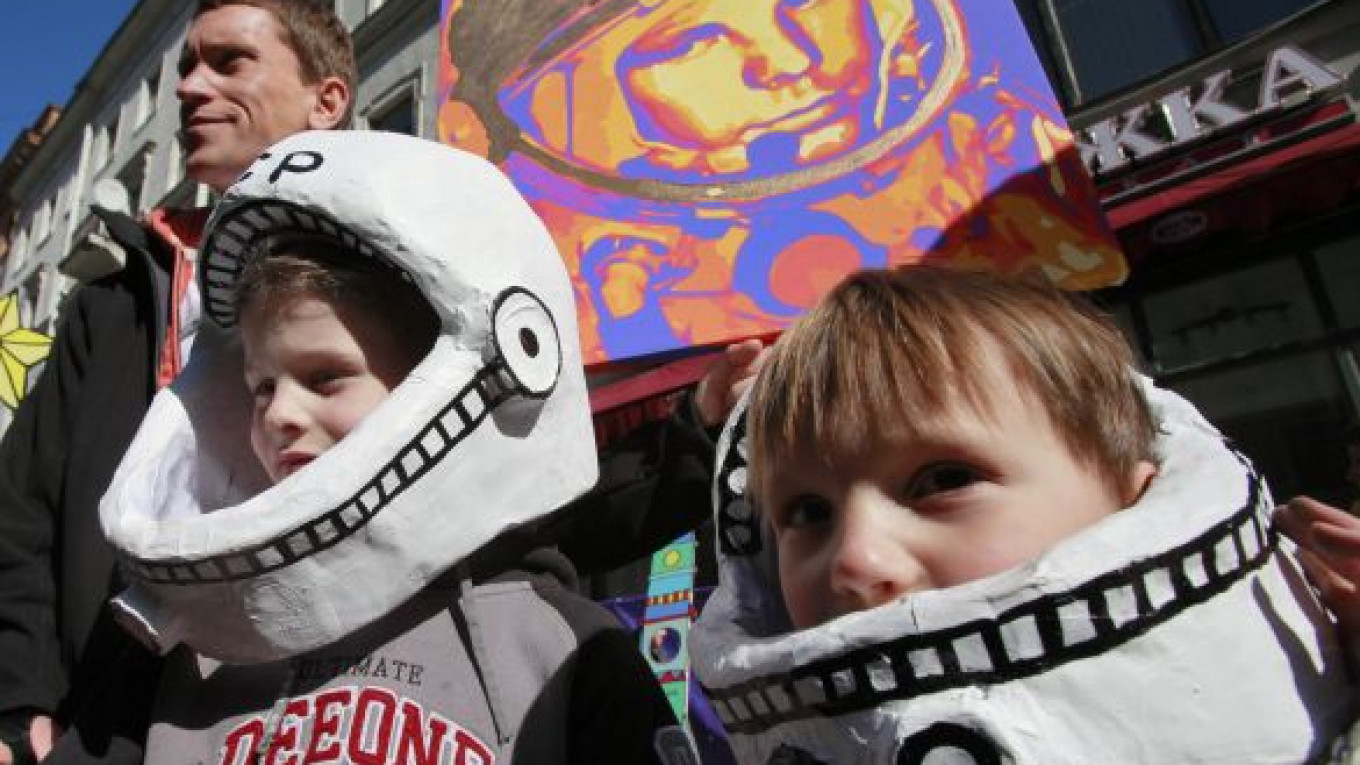Russia must preserve its pre-eminence in space, President Dmitry Medvedev declared Tuesday on the 50th anniversary of the first human spaceflight by cosmonaut Yury Gagarin.
The statement followed warnings by another cosmonaut that Russia risks losing its edge in space research by relying solely on Soviet-era achievements and doing little to develop new space technologies.
Gagarin's 108-minute mission on April 12, 1961, remains a source of great national pride, and Russia marked the day with fanfare resembling Soviet-era celebrations. Schools had special lessons dedicated to Gagarin, billboards carried his smiling face and national television channels broadcast a flow of movies and documentaries about the flight.
"We were the first to fly to space and have had a great number of achievements, and we mustn't lose our advantage," Medvedev said during a visit to Mission Control outside Moscow.
On Monday, Svetlana Savitskaya, who flew space missions in 1982 and 1984 and became the first woman to make a spacewalk, harshly criticized the Kremlin for paying little attention to space research after the 1991 collapse of the Soviet Union.
"There's nothing new to be proud of in the last 20 years," said Savitskaya, a State Duma deputy from the Communist Party.
Russia has used the Soyuz and Progress spacecraft, whose designs date back to the 1960s, to send an increasing number of crew and cargo to the International Space Station. Russia's importance will grow even more after the U.S. space shuttle Atlantis closes out the U.S. program this summer, leaving the Russian spacecraft as the only link to the station.
But Savitskaya and some other cosmonauts have warned that Russia has done little to build a replacement to the Soyuz and could quickly fall behind America after it builds a new-generation spaceship.
Boris Chertok, the former deputy to Sergei Korolyov, the father of the Soviet space program, says it has become increasingly difficult for Russia's space industries to hire new personnel.
"Salaries in space industries are much lower than average salaries in banks and commercial companies," Chertok, 99, told reporters last week. "We need [more] people of Korolyov's caliber."
Korolyov, a visionary scientist as well as a tough manager, led the team that put the world's first man-made satellite in orbit on Oct. 4, 1957. He then spearheaded a massive effort to score another first with Gagarin's mission.
"Our competition with America was spurring us to move faster to make the first human spaceflight," said Valery Kubasov, a member of Korolyov's design team who later became a cosmonaut.
Gagarin's accomplishment shocked the United States, prompting it to declare the goal of putting a man on the moon.
"Without Yury Alexeyevich's flight, I wouldn't have flown to the moon," said Thomas Stafford, commander of the Apollo 10 mission that approached within 13 kilometers of the moon in May 1969, the last U.S. mission before its moon landing three months later.
"He was a great hero for the Soviet Union and the entire world," Stafford said in Russian after receiving a medal Tuesday from Medvedev at a Kremlin award ceremony that honored cosmonauts and astronauts.
Gagarin, who later crisscrossed the world as a living symbol of Soviet talent, craved more space trips. Cosmonaut Vladimir Shatalov said Gagarin was dreaming about going to the moon and was among those selected to train for the mission in a race against the United States. "He hoped to take part in that, he hoped to fly to the moon," Shatalov said during an interview at the Star City cosmonaut training center, where Gagarin trained.
Gagarin was a backup for his friend Vladimir Komarov, who died when his space capsule crashed on re-entry in April 1967. Fearing any injuries to their space star, Soviet authorities decided to bar Gagarin from flying into space again.
Gagarin's own death in a training jet crash on March 27, 1968, is shrouded in conspiracy theories to this day. Shatalov, who had planned to follow Gagarin on another training flight that day, said the most likely reason for Gagarin's crash was a sonic wave from another military jet flying too close.
A Message from The Moscow Times:
Dear readers,
We are facing unprecedented challenges. Russia's Prosecutor General's Office has designated The Moscow Times as an "undesirable" organization, criminalizing our work and putting our staff at risk of prosecution. This follows our earlier unjust labeling as a "foreign agent."
These actions are direct attempts to silence independent journalism in Russia. The authorities claim our work "discredits the decisions of the Russian leadership." We see things differently: we strive to provide accurate, unbiased reporting on Russia.
We, the journalists of The Moscow Times, refuse to be silenced. But to continue our work, we need your help.
Your support, no matter how small, makes a world of difference. If you can, please support us monthly starting from just $2. It's quick to set up, and every contribution makes a significant impact.
By supporting The Moscow Times, you're defending open, independent journalism in the face of repression. Thank you for standing with us.
Remind me later.






